|
Obsolete Outboards |

|
|
by Max Wawrzyniak - St Louis, Missouri - USA
Paperwork
|
 |
Having the correct paperwork makes any job easier, and that
is especially true in regards to working on old outboard motors.
A bit of printed information can take much of the mystery out of
repairs, just as the proper chart can greatly aid in navigating
unfamilar waters.
The first sort of paper work associated with outboard motors are
owner's manuals. These are rather basic guides to the operation
and maintenance of a particular outboard model. For those unfamilar
with outboards motors, an operator's manual can be very useful, providing
such information as how to properly mount the outboard on the boat,
starting and operating instructions, gasoline/oil mixing instructions,
lower unit lubrication information, and other general maintenance items.
If your outboard comes with the original owner's manual, that is a good
sign that the motor MIGHT have received good care, but it is certainly
no guarantee of same. If your engine did not come with an owner's
manual, I don't know if I would spend much money trying to obtain
a copy, as the money might be better spent on other paperwork.
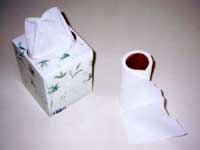 |
Any job goes smoother with the correct paperwork for the job
at hand.
(click images for larger views) |
|
Such as a service manual. A service manual gives much more info
on repairs than an owner's manual does, but usually does not give too
much info on routine maintenance. The owner of an old outboard motor
has a choice when it comes to service manuals: one can obtain a copy
of a factory service manual, or one can get an aftermarket version of a
service manual. While the factory service manual is a much more complete
and all-encompassing text, most owners of old outboards are not really
interested in performing major overhauls of their engines, so the extra material
may not really justify the extra cost of a genuine factory service manual.
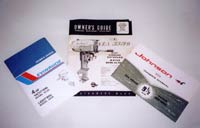 Owner's manuals don't really contain much information, but if you are
new to outboard motors, an owner's manual can be a very handy item
to have. If one comes with your engine, so much the better, but if you
would have to buy one, you might be ahead putting the cash towards
a service manual. Owner's manuals don't really contain much information, but if you are
new to outboard motors, an owner's manual can be a very handy item
to have. If one comes with your engine, so much the better, but if you
would have to buy one, you might be ahead putting the cash towards
a service manual. |
|
Factory service manuals come in two flavors: a big, thick manual (or set of
manuals) that covers the whole engine line or a major portion of the
engine line, or a much slimmer factory service manual that covers just
a specific model. For the casual outboard tinkerer, it is hard to justify the
cost of the "monster" manual. Copies of OMC factory service manuals can often
be obtained from the Ken Cook Company.
|
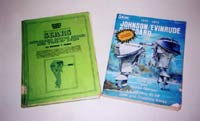 A Seloc Johnson/Evinrude service manual, covering models from 1956 to
1970, next to a Glenns service manual for 1960's era Sears outboard motors.
While I generally would not recommend a 1960's Sears outboard for the
cheap power seeker, there is nothing worng with the Glenns series of
aftermarket service manuals, should you happen to run a across one.
Since your old outboard is not the "latest edition," your manual certainly
does not need to be either. A Seloc Johnson/Evinrude service manual, covering models from 1956 to
1970, next to a Glenns service manual for 1960's era Sears outboard motors.
While I generally would not recommend a 1960's Sears outboard for the
cheap power seeker, there is nothing worng with the Glenns series of
aftermarket service manuals, should you happen to run a across one.
Since your old outboard is not the "latest edition," your manual certainly
does not need to be either.
|
|
Then there are the aftermarket manuals. These manuals, printed by publishers
with no affiliation with the motor manufacturer, come in two versions that are of
interest to us, since we are primarily interested in old OMC (Outboard Marine
Corporation) manufactured motors. The first version covers only OMC outboards
and is close to the factory service manual as to depth of information, while the
second type of aftermarket service manual covers many brands of outboard
motors, but in much less depth. Either of these manuals will provide the novice
old outboard repairman with sufficient info for the repairs that he is likely to want
to tackle.
| A copy of Intertec's "Old Outboard Motor Service Manual" (covering many
brands of older outboard motors) and Clmer's Evinrude-Johnson service manual,
covering years 1956 to 1972. That's an Intertec manual opened up to show the
pretty pictures |
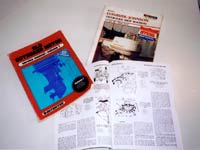 |
|
Examples of the first type of aftermarket manual are one published by Seloc which
covers Johnson and Evinrude outboards of 1.5 hp to 40 hp, 1956 to 1970. Clymer
also publishes a similar manual, covering Johnson and Evinrude outboards of
1.5 hp to 125 hp, 1956 to 1972. My copies of these manuals are a few years old,
and current versions might differ a bit. Used copies can often be
found through the online used book purveyors. Both of these manuals are a good
source of repair information and they can usually be bought for less money than
the offical factory service manual.
|
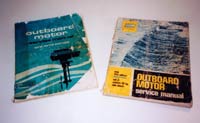 These are older "Abos" versions of the Intertec service manual, but are not
labeled as manuals for "old" outboards because the outboards were almost
"new" when these editions were printed. The blue one I picked up for, I think,
about 25 cents as library surplus almost 30 years ago, while the other one
came with an old outboard I bought maybe 6 years ago. These are older "Abos" versions of the Intertec service manual, but are not
labeled as manuals for "old" outboards because the outboards were almost
"new" when these editions were printed. The blue one I picked up for, I think,
about 25 cents as library surplus almost 30 years ago, while the other one
came with an old outboard I bought maybe 6 years ago.
|
|
Intertec's "Old Outboard Motor Service Manual" is an example of the later type,
covering many brands of outboards manufactured from about 1955 until about
1968. Volume #1 covers outboards of under 30 hp, while volume #2 covers 30 hp
and over. Note that Interec also publishes these manuals for newer engines; if your
engine is 1969 or older, you want the "Old outboard" manual. Earlier versions
of this same manual were published under the Abos Publishing name.
| Parts diagrams for 1958 Evinrudes. The "exploded views" come in real
handy when taking things apart and putting them back together. Locating
replacement parts is also easier when you have the part number and the
parts counter man (or woman) does not have to look it up. |
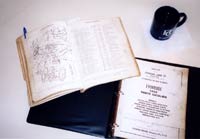 |
|
The next bit of helpful paperwork is the parts diagram, alternately referred to as
a parts break-down or "exploded view." This is a drawing showing all the parts of
the outboard and their relationships to each other, and also lists the factory part
number for each part. A parts diagram can be very helpful during dissasembly and
reassembly, as the drawing shows how the parts all fit together, and if you need
replacement parts having the part numbers can be a big help in locating what
you need. There are no aftermarket parts diagrams available, but usually a factory
parts list can be bought from the Ken Cook company, and an inquiry on a old outboard
motor discussion group or chat page will often result in someone e-mailing a scaned
copy. I have e-mailed parts diagrams many times (a statement that should not be
construed to mean that I will make a full-time job of it !)
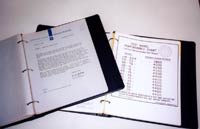 |
Service bulletins are virtually unobtainable, but are hardly necessary for
the casual obsolete outboarder. They do make interesting reading at times.
The one on the right lists full throttle RPM's for outboards running test
propellers (see Propellers column) in a test tank.
|
|
The last bit of helpful paperwork, and the most difficult to find, are the service bulletins,
which were notices sent by the factory to dealer service departments from time to
time to advise of particular problems with certain engines, or to advise of changes
in engines or to inform the service departments of new repair procedures. Service bulletins
generally were not available to the general public when printed, and as far as I know
reprints of service bulletins affecting old engines are not avialable from any source.
Over the years I have managed to collect quite a few (but not all) service bulletins afffecting
OMC-built outboards of the 1950's and 1960's. I bought these at swap meets and from
closed outboard dealerships and have spent many an evening reading them (shows how
exciting my life is). But in addition to useful information, one can often find fascinating
stories contained within these service bulletins; for example, Evinrude brought out a new
model 15 hp outboard for 1955 and immediately began experiencing problems with water
climbing up the vertical driveshaft and getting into the lower crankshaft bearing, causing the
bearing to rust. A series of service bulletins describes the problem and recommend a fix,
while providing details as to how later engines were modified to correct the problem.
So maybe it's not "War and Peace:" I still think it's interesting.
| Years of collecting parts manuals, service manuals and service bulletins. These
binders are just those items I have gotten around to organizing; there is still a bit
of a pile that i need to work through. |
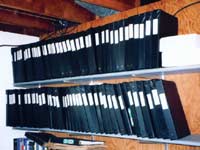 |
|
While very useful, chances are you are not going to get any service bulletins for your particular
engine, but with a parts diagram and some sort of service manual in had, you will still be well
prepared to deal with your old outboad motor. And don't forget that with discussion groups
and chat pages, help with an outboard problem is usually only a "post" or two away.

click here for a list of Columns by Max Wawrzyniak
|